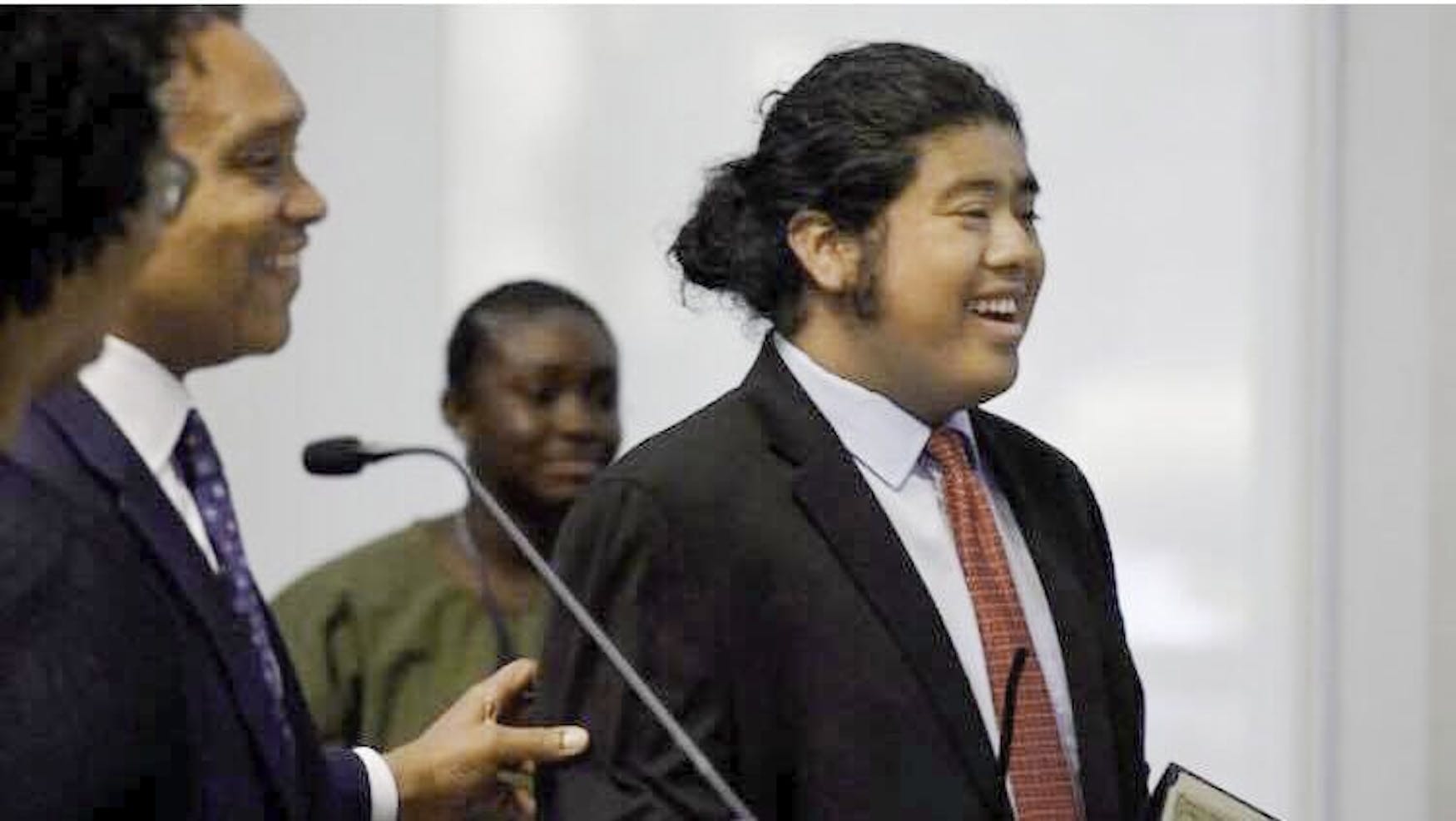From 'Deis Campus to D.C. Council
Sophomore Angel Henriquez '22 plans to run for the D.C. Council after graduating Brandeis — and has already jump-started his political career.
Angel Henriquez ’22 is a devoted fan of the Washington, D.C. football team, but won’t say the team’s name aloud because “it’s disrespectful, and the name should be changed.” Since the 2016 presidential election, Henriquez has stopped wearing team gear and decided the only way to challenge the inequity around him is to become the first Latino member of the D.C. city council — but not the last. Henriquez plans to run after graduating Brandeis and to work his way into mayoral office eventually. In the meantime, the Brandeis sophomore spends his breaks working in local Washington politics, is working remotely with a non-profit, and has “made a name for [him]self” at home, he told the Justice in an interview.
Henriquez’s political awakening came about after the 2016 election, when he was 16. He had felt there was “no way” Trump could win, and felt afterward that “this country [had] stepped backwards instead of forwards.” In reaction, he began organizing through a group called Critical Exposure. CE taught him organizing and photography skills, helping him showcase injustices he saw. Then, Henriquez helped organize fellow young people in D.C. to voice concerns to the mayor in a forum through the non-profit Mikva Challenge D.C. “I told [the mayor] I was going to take her job,” he said, adding, “She didn’t like it. She was so in shock.”
Henriquez’s main focus is civic engagement and outreach within the Washington Latinx community. He feels they “need to understand that [the D.C. government] is here for them, … is here to serve them.” He first learned about local politics through Mikva Challenge D.C., which secured him an internship with Charles Allen, a D.C. city councilor. Allen “showed [Henriquez] the ins and outs of the D.C. Council.” Henriquez presented Allen with a plan to help engage the Latinx community, and hopes Allen will take action.
Henriquez also cares deeply about immigration, saying that though Washington is a sanctuary city, Murial Bowser, the mayor, does not enforce those protections. Henriquez’s other major talking points include issues which affect “people of color in general”: Affordable housing and fighting gentrification, stopping police and gun violence, and providing resources. Specific policies he wants to enact include building “actual” affordable housing — the city is barely affordable despite the mayor’s efforts, according to Henriquez — and offering District residents priority in hiring processes, as opposed to spending the District’s $14 minimum wage on Maryland and Virginia residents. He also helped lobby to lower the voting age to 16 in Washington, and is passionate about providing opportunities for young people. D.C. statehood is another important issue for Henriquez; he’s proud of demonstrating why he feels it is important, and displaying why D.C. residents deserve their own representation.
Henriquez credits his high school with helping set him on his current path. School precollege programs helped him intern at the United States Holocaust Memorial Museum, which taught him to about “being civically active, not be[ing] silent when injustice is occurring, not being a bystander.” A precollege counselor also connected him with Critical Exposure, telling him, “You have the passion. … You could do this, you’re a rebel without a cause.” He had wanted to become politically active, but without the community organizing skills he learned, “you automatically fail” in politics.
Henriquez loves his home city and, even once elected, he plans to remain “humble.” He hopes to stay among his constituents, saying if he represents his community, he must “live with the people, go to work with the people, eat with the people.” Asked about loving Washington from a distance and remaining politically engaged while at Brandeis, Henriquez said it is tough but “at the end of the day, [he is] here to reach [his] end goal, which is the D.C. Council.” He misses the city — the food, the music.
Discussing gentrification changing neighborhoods, Henriquez said, “If you’re coming to live in OUR city, you don’t tell us what we can do.” Talking about a favorite drink at home, Rock Creek Soda, Henriquez noted that it used to cost 99 cents, but now sells for $1.99, an example of how gentrification is “really hitting D.C.” He makes an effort to stay in touch with the city while away, noting that he has many opportunities to “stay active.” Currently, he is working on an unnamed candidate’s political campaign and partnering with a nonprofit. The distance from Washington during the school year is “a curse … and a great time,” because he is able to step back a bit.
Henriquez also has strong ties to El Salvador, where his parents were born. They both immigrated to the U.S. in the 1980s, meeting here as they fled civil war. Henriquez follows politics in El Salvador, noting that the current administration have incorporated a progressive punitive system: “They have zero tolerance [for gang violence] but they are arresting them and making them build houses, … making them do hard labor for money.” He hopes to visit one day, saying, “That’s the dream.”
At Brandeis, Henriquez has found a lot of support from fellow members of the Myra Kraft Transitional Year Program, friends, and others: “They really like the work, they really like the passion.” Henriquez is on the executive board for the Brandeis Latinx Club and is a member of the Men of Color Alliance. He’s proud of spreading an image of the District that extends beyond the monuments, he said.



Please note All comments are eligible for publication in The Justice.